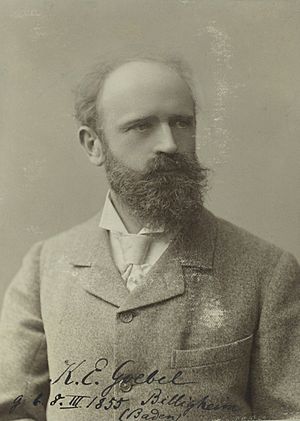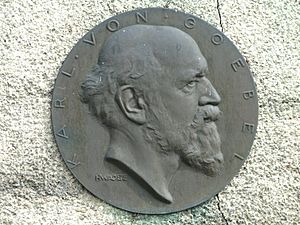Karl Ritter von Goebel facts for kids
Karl Immanuel Eberhard Ritter von Goebel (born March 8, 1855, died October 9, 1932) was a famous German botanist. He spent his life studying plants. He looked at their shapes, how they work, and how they grow. He also explored how plants change over time and how their surroundings affect them.
Contents
Goebel's Early Life and Studies
Karl Goebel began his studies in 1873. He first studied theology and philosophy. Then he focused on botany, which is the study of plants. He learned from important scientists like Wilhelm Hofmeister at the University of Tuebingen.
In 1876, he moved to Strasbourg. There, he worked with Anton de Bary, another famous botanist. Goebel earned his Ph.D. in 1877. After that, he became an assistant to Julius von Sachs in 1878.
A Career in Botany
Goebel became a lecturer at the University of Würzburg in 1880. He then worked at the University of Leipzig. In 1882, he became a professor at the University of Rostock. There, in 1884, he started a botanical garden and a special institute for plant studies.
From 1887 to 1891, he was a professor at Marburg. Then, from 1891 to 1931, he taught at the University of Munich. At Munich, he helped design the new Botanischer Garten München-Nymphenburg. He was also its very first director.
Exploring the World for Plants
Karl Goebel loved to travel and study plants in different places. In 1885 and 1886, he went on research trips to Ceylon (now Sri Lanka) and Java. Later, in 1890 and 1891, he explored Venezuela and British Guiana. These trips helped him learn more about plants from around the world.
Honors and Legacy
Goebel was a very respected scientist. From 1889, he was the editor of "Flora," a major science journal. In 1892, he became a full member of the Bavarian Academy of Sciences. He even served as its President later on.
In 1910, he was made an Honorary Fellow of the Royal Society of Edinburgh. A special honor came in 1911. A botanist named Franz Stephani named a new family of plants after him. This plant family is called Goebeliellaceae. It includes a type of small plant called a liverwort.
Goebel also became a foreign member of the Accademia Nazionale dei Lincei in Rome in 1914. In 1926, he was elected to the Royal Society. In 1931, he received the Linnean Medal. This is a very important award from the Linnean Society of London.
 | Dorothy Vaughan |
 | Charles Henry Turner |
 | Hildrus Poindexter |
 | Henry Cecil McBay |



